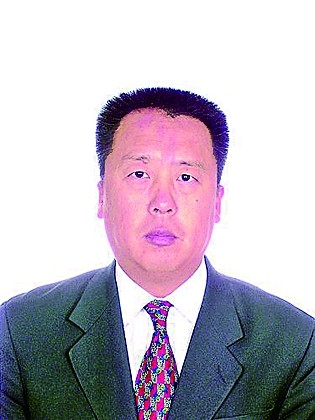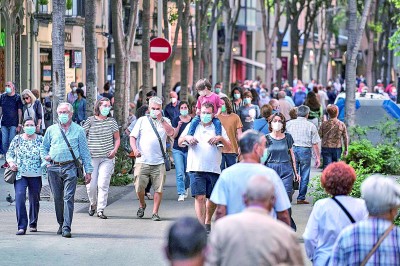



Guest:
Ceyla Pazarbasioglu: Vice President, the World Bank
Xiao Lianbing: Secretary-General, Center of International Exchange and Communications, Guangming Daily
“71 million people will fall into extreme poverty”
Xiao Lianbing: It is our great pleasure to have you with us at Guangming Daily’s International Forum Dialogue. You are the third senior executive of an international organization to join this Forum Dialogue. As we all know, since the outbreak of COVID-19 pandemic around the world earlier this year, in order to contain the spread of the virus, countries fully or partially shut down their economic activities and suspended most of the international flights and land transport. The world economy came to a standstill. The movement of people and goods has been a major characteristic of globalization. Now with the disruption in the movement of people and goods as well as in the global production chain, there are growing concerns over the decline of the global economy and estimates of COVID-19’s economic impact .
Ceyla Pazarbasioglu:The COVID-19 pandemic has spread with alarming speed to almost every corner of the world. The health crisis it has caused and efforts to contain its spread have caused an economic shock of enormous magnitude, leading to steep recessions in many countries and causing the largest economic shock the world economy has experienced in decades. The pandemic and associated mitigation measures have sharply curbed consumption, investment, labor supply and production. Cross-border spill-overs have disrupted financial and commodity markets, global trade, supply chains, travel, and tourism.
Financial markets have been extremely volatile, reflecting exceptionally high uncertainty and the deteriorating outlook. Investor flight to safety has led to a sharp tightening of global and emerging market and developing economy financial conditions. Equity markets around the world have declined, spreads on riskier categories of debt have widened, and emerging market and developing economies experienced large capital outflows. Industrial and energy commodity prices have tumbled as a result of falling global demand. Oil prices have been particularly affected by the demand collapse.
Many countries have provided large-scale macroeconomic support to alleviate the blow of these shocks, and this has contributed to a stabilization in financial markets. Even so, the pandemic is expected to plunge a majority of countries into recession this year, with per capita output contracting in the largest share of countries – 93% -- since 1870. Contractions in per capita incomes in the vast majority of emerging market and developing economies are anticipated to push 71 million more people into extreme poverty, according the World Bank’s baseline global GDP forecast, and reverse many of the development gains of recent years. This is a situation of serious concern.
“Global growth prospect in the near term faces exceptionally high uncertainty”
Xiao Lianbing: Thinktanks and international organizations are all working hard to analyze and predict the trends of the world economy. They try to assess and determine the global economic developments over time given the impact of the pandemic. Since the outbreak of COVID-19, the International Monetary Fund (IMF) in the World Economic Outlook predicted that global economy will contract by 3% this year. A follow-up IMF report predicted a 4.9% economic contraction globally, 1.9 percentage points lower than the April prediction. The report also said that the total global economic losses in 2020 and 2021 may exceed US$12 trillion due to COVID-19. In the World Bank’s Global Economic Prospects released on June 8, what predictions do you have for the world economy?
Ceyla Pazarbasioglu: The World Bank’s Global Economic Prospects report, which was published June 8, and therefore more recently than our colleagues, had a baseline forecast that the global economy would contract by 5.2%, at market exchange rate weights. The IMF’s global forecast uses purchasing power parity weights for aggregates. Using PPP weights, the World Bank forecast equates to a 4.1% global output contraction. The World Bank anticipates that emerging market and developing economies will contract by 2.5% in 2020 due to adverse spillover effects from advanced economies and disruptions associated with coping with the health crisis. This would be well below the previous emerging market and developing economy growth low of 0.9% registered in 1982 and the weakest emerging market and developing economy economic performance since on records dating to 1960.
These forecasts are under the baseline scenario, which envisions that global trade will fall about 13 percent, in part because the centrality of several economies with large outbreaks to global value chains. The baseline assumes a recovery would get underway in the second half of 2020 once lockdowns and other restrictions are unwound. Still, despite large-scale fiscal and monetary support, this recovery would be tentative. Even as employment picks back up, households would only slowly increase consumption. Firms would hold back on increasing investment until they became confident the rebound was truly gaining traction. International travel would resume only slowly. The lifting of control measures would end by the conclusion of 2020 and set the stage for a rebound in global growth to 4.2% in 2021. This would nevertheless be below January forecasts, reflecting likely shifts in consumption and work patterns that would weigh on aggregate demand.

(via.Xinhua)
Xiao Lianbing: Stock market and futures market are said to be barometers of the economy. These markets have experienced significant fluctuations since the outbreak of the pandemic, causing widespread panic across the world. People tend to compare the current crisis with previous crises in history. Some said the current economic crisis will be the most severe since the last century, while others said that it is not that bad. They think the economic relief measures taken by countries have prevented the world economy from deteriorating further. How would you comment on these different views?
It is important to note that near term global growth projections in this environment are subject to an unusually high degree of uncertainty. A downside scenario considers that renewed flareups of the virus would require stringent control measures to remain in place through the third quarter of 2020 in many countries. It would include the possibility of financial stress in a number of emerging market and developing economies. Under this course of developments, the global economy could contract by nearly 10 percent in 2020, and recover to a sluggish 1.3% in 2021.
There is an upside scenario as well: pandemic control measures could largely be lifted by the end of the second quarter in advanced economies, with emerging market and developing economies following suit not long after. Economic activity would pick up in major economies in the third quarter as businesses re-opened, trade and travel barriers were lifted, and confidence recovered. Under this scenario, global output would recover by about 4 percent in 2020 and grow strongly above 5% in 2021.
Ceyla Pazarbasioglu: The COVID-19 pandemic and mitigation measures dealt a devastating blow to a global economy that was already weak – 2019 was the lowest global aggregate growth rate since the financial crisis. Beyond the short-term impact of the pandemic and containment measures, the deep recessions it has triggered are likely to leave lasting scars through multiple channels, including lower investment, erosion of human capital of the unemployed and the schooling-deprived, and a retreat from global trade and supply linkages. These effects may well lead to lower potential growth and labor productivity in the longer term.
Many emerging market and developing economies entered this global recession less well-prepared, and with greater vulnerabilities, than before the last global recession in 2009. Those emerging market and developing economies that have weak health systems, are heavily reliant on trade or tourism, are vulnerable to financial disruption, or are heavily dependent on oil or other commodity exports, will be the most vulnerable.
Long-term damage will be particularly severe in economies that experience financial crises, and in energy exporters, because of the decline in oil prices. Productivity growth and private investment have been weak in the past decade; the pandemic is likely to make that worse. Recessions associated with the pandemic will likely have a particularly damaging effect on long-term growth prospects because of pre-existing vulnerabilities, fading demographic dividends, structural bottlenecks, and changes in behavior patterns. Emerging market and developing economy growth has fallen short of its long-term term average in recent years; the pandemic is expected to exacerbate the multi-decade trend slowdown in potential output growth and productivity growth.
While the immediate priorities of policymakers are to address the health crisis and to moderate short-term economic losses, they must forcefully undertake comprehensive reform programs to improve the fundamental drivers of growth if they are to address these worrisome long-term trends.
"Governments face major challenges in the post-pandemic era"
Xiao Lianbing: Mankind makes progress in coping with disasters, gaining experience and tackling challenges over time. This pandemic has revealed the fragilities in state governance, such as shortage of healthcare resources, production capacity and medical supplies. These unexpected issues have made people across the world to rethink state governance. Governments face new policy and governance challenges. In your view, what is the biggest challenge facing governments in the post-pandemic era?
Ceyla Pazarbasioglu: In the immediate term, authorities in advanced economies face the urgent challenge of containing COVID-19, finding the most effective treatments for this new disease, and developing a vaccine, as well as containing the economic fallout from the pandemic. As the world struggles through the health and economic impacts of the pandemic, international policy coordination is critical. In the longer run, advanced economies need to address gaps in epidemic preparedness and social safety nets exposed by the crisis.
Emerging market and developing economies face the immediate challenge of providing support to front-line health workers, broadening access to medical services to detect and treat COVID-19, and prioritizing the timely dissemination of information. Many emerging markets have limited fiscal space to address the crisis, highlighting the role of international assistance. Spending may need to be reprioritized to the more urgent needs to save lives and protect the most vulnerable.
In the medium term, a renewed emphasis on structural reforms and inclusive and environmentally sustainable post-disaster investments, as well as the development of sound fiscal policy frameworks, institutions and business environments, can help establish a robust and resilient recovery. Structural reforms will need to be carefully calibrated to each country’s circumstances. In general, these could include policies to promote investment in human and physical capital, including green infrastructure, reallocation of resources toward more productive sectors, and greater rates of technology adoption. Reforms to reduce excessive regulations and litigiousness could also be pursued. Oil exporting economies might find it timely to expand economic diversification. Policymakers could also consider new insurance frameworks to enhance the quality and transparency of risk sharing during systemic economic disruptions.
In the longer run, the pandemic highlights the urgency of investing in resilient health care systems, addressing the challenges posed by widespread informality, and pursuing growth enhancing structural reforms. To set the stage for a robust and resilient recovery, policymakers must first implement a comprehensive set of policies to alleviate solvency strains, and where necessary prevent bankruptcies of firms that will be viable in the longer run without infringing on the integrity of private ownership. Where possible, support can be employed to invest in digital infrastructure to ensure uninterrupted provision of critical services to a broad set of households, including those in the informal sector, while facilitating wider adoption of those technologies.

(via.Xinhua)
Xiao Lianbing: The United Nations have set the Sustainable Development Goals. During the pandemic, countries have implemented economic relief programs, which are closely related to the goal of sustainable social and economic development. The impact of the pandemic varies among developing and developed countries. Countries have tailored economic relief programs to their own conditions and needs, with varied outcomes. In the post-pandemic era, what are the more urgent issues that developing countries should focus on? How should they address these issues?
The economic downturn associated with the COVID-19 pandemic response is expected in the World Bank’s baseline scenario, to push an additional 71 million people into extreme poverty. The economic repercussions of the crisis response have dealt a setback to achieving many development goals.
Ceyla Pazarbasioglu: The pandemic underscores the crucial value of global coordination and cooperation in pubic health as well as in economic policy. In late March the G7 pledged to “do whatever is necessary to restore confidence and economic growth and to protect jobs, businesses, and the resilience of the financial system.” Many fiscally constrained emerging market and developing economies will benefit from the coordinated support of G20 countries and multilateral organizations. International financial institutions can adopt a two-phase approach to their policy response: first, rapid policy support can be deployed to help provide the resources necessary to protect the most vulnerable, keeping firms and jobs in place. In the second phase, policy should focus on ensuring a strong and sustainable economic recovery, seizing the opportunity to increase investment in infrastructure, human capital, and growth-enhancing institutions.
Policymakers in many emerging market economies have responded swiftly to the pandemic with a variety of monetary and financial policies, including both traditional and novel measures, in response to the critical need of supporting the flow of credit and preserving the functioning of financial markets. This has been essential to alleviating the immediate impact of the crisis.
The pandemic, coupled with the rising frequency of biological and other natural disasters, highlights the critical need to invest in health care capacity to prevent and better cope with future health and economic crises. It also highlights the challenges of widespread informality and small and medium firm financing constraints in emerging market and developing economies.
Given these challenges, pandemic-control measures will need to be complemented with measures that support the income of the most vulnerable firms and households that have been pushed into poverty. Authorities need to preserve access to essential health and human services. Maintaining access to education is critical for avoiding irrevocable losses to human capital. Where income redistribution systems are absent, policies such as untargeted cash transfers, public works programs and food aid may minimize any delays in providing assistance. Prompt support from the international community can play a key role in financing these efforts in countries without necessary fiscal capacity.
Xiao Lianbing: How would you comment the measures taken by the Chinese government to restore and reopen the economy?
Ceyla Pazarbasioglu: Like all other major economies, the Chinese authorities have continuously stepped up policy measures to cushion the economic and social impacts of the COVID19-induced downturn. The initial policy response aimed to bolster market confidence, relieve near-term cash flow problems and mitigate more permanent economic damage in the form of bankruptcy, unemployment, and rising nonperforming loans. As the lockdown measures were rolled back, the policy focus shifted towards providing stimulus to support the recovery pledging accommodative monetary policy and additional public investment, tax relief, and social transfers. Like elsewhere, these efforts offer an important opportunity not only to make the short term recovery stronger, but to accelerate China’s progress towards achieving its medium-term objectives of rebalancing the economy towards more inclusive, sustainable, and greener growth. This calls for placing priority on enhancing China’s social safety nets to cushion impacts on households and channeling resources to lower-income households and communities. Public investment support should be designed to ensure China’s recovery is consistent with and indeed accelerates the transition towards a carbon-neutral, cleaner and greener economy.
“The pandemic highlights the importance of global coordination and cooperation”
Xiao Lianbing: The World Bank has long been committed to promoting the economic development in both developing and less developed countries. As one of its founding members, China has maintained a good cooperative relationship with the World Bank Group ever since the restoration of its lawful seat 40 years ago. China and the World Bank Group have achieved remarkable results in global development, financing, and knowledge sharing. China is now the third largest shareholder of the World Bank as well as an important borrower, donor and development partner. China has received assistance from the World Bank Group while also providing support to the instution. The relationship between China and the World Bank has been evolving over time. China has worked with the World Bank in helping developing countries overcome the difficulties caused by the pandemic. In your view, what matters the most in the post-pandemic era in terms of cooperation between developed and developing countries in the areas of public health security?
Ceyla Pazarbasioglu: Health is a foundational investment in human capital and economic growth. Without good health, children can’t go to school and learn, and adults can’t work and contribute to their households and economies. The World Bank Group supports countries on their path towards Universal Health Coverage – ensuring that all people obtain quality health services without suffering financial hardship.
In terms of the World Bank Group’s response to the COVID-19 pandemic, the institution is taking broad, fast action to help developing countries strengthen their pandemic response and health care systems. The World Bank Group will be providing up to $160 billion in financing over 15 months, tailored to the health, economic and social shocks countries are facing. This includes $50 billion of new concessional transfers from the International Development Association, or IDA, the World Bank’s facility for the poorest, with built-in debt relief for countries at risk of debt distress. In addition to ongoing health support, operations will emphasize social protection, poverty alleviation, and policy-based financing. The institution is delivering record support to 100 countries, home to 70% of the population. We are helping them implement emergency health operations, protect the poorest households, save jobs and businesses, and get money to people who need it most.
More broadly, since 2003, there have been several serious epidemics, and these experiences underscore the importance for emerging market and developing economies to provide broad based access to medical services to identify and treat acute symptoms during health emergencies. Authorities need to take steps to strengthen clinical and general health care, invest in access to clean water and sanitation, and tighten food safety standards.
I can say that, as mentioned earlier, the G7 has pledged to do whatever is necessary to restore confidence and economic growth and to protect jobs, businesses, and the resilience of the financial system. In addition, many emerging market and developing economies will benefit from the coordinated support of the G20 and multilateral organizations. The pandemic underscores the crucial value of global coordination and cooperation in public health as well as in economic policy.
The 189-member World Bank, for its part, has acted quickly and decisively in response to the pandemic, as described above, and many others have stepped up as well.
One of the ways in which the COVID-19 pandemic is disrupting economic activity is through its impact on global value chains, which can amplify the effects of shocks on trade, production, and financial markets. Even before the pandemic, the growth in GVCs had been trending lower. Shocks from the pandemic could cause GVC participants to re-assess the viability of existing production networks and explore whether they increase the geographic diversity of supply chains, or even reshore production.
Xiao Lianbing: The history of human civilization is a history of struggles against diseases and disasters. This pandemic shows that viruses respect no borders or races; the international community faces a common challenge, and mankind has a shared destiny. During the epidemic, Chinese President Xi Jinping called for building community of common health for mankind. At the opening of the 73rd World Health Assembly, he announced that China will provide US$2 billion in international assistance over two years. As the international community can see, as a developing country, “China is an opportunity, rather than a threat; and China is a partner, not an opponent.” China will assume international responsibilities, and do what it has promised to do and do it well. China has made great contributions to global poverty reduction. China has benefited from the world, while the world has also benefited from China. The World Bank was founded after the Second World War. Today it is important to revisit the common interests and responsibilities of the international community amid the pandemic, and discuss cooperation between developed and developing countries, and among developing countries.
Ceyla Pazarbasioglu: We at the World Bank have identified as our mission a few key global goals: ending extreme poverty and boosting shared prosperity. Developing countries made spectacular gains in the last generation—economic growth and open trade has enabled nearly 1.1 billion people to escape extreme poverty since 1990—yet major challenges remain. Complex, global issues like forced migration, climate change, pandemics, and conflict threaten to undermine current development efforts.
As we pursue our mission, we identified three ways to reach our goals: ending poverty through inclusive, sustainable economic growth; reducing inequality by investing in people to build human capital, and fostering resilience by promoting sustainable development. With our 189 members, we are a global partnership. The world we envision is achievable.
Xiao Lianbing:“One World, One Dream” was the slogan for the 2008 Beijing Olympic Games. It reflects the common understanding of the international community and mankind’s common wish for a better life.
点击右上角![]() 微信好友
微信好友
 朋友圈
朋友圈

请使用浏览器分享功能进行分享
